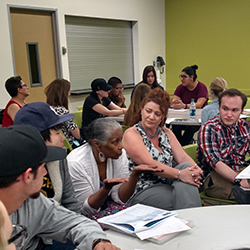Special Issue on Cultural Competency Pedagogy in Graduate Public Affairs Education
Guest Editors:
Marla A. Parker, PhD, Assistant Professor in the Department of Political Science at California State University Los Angeles
April Jackson, PhD, Assistant Professor in the Department of Urban & Regional Planning at Florida State University
Lisa Turner DeVera, Associate Director, Interdisciplinary Program in Social Sciences and Specialized Faculty, Department of Urban & Regional Planning at Florida State University
For inquiries, please contact mparke17@calstatela.edu or ajackson5@fsu.edu
This eJournal special issue will focus on projects and approaches to developing, implementing, and supporting cultural competency pedagogy in graduate public affairs programs or related disciplines. We define cultural competency pedagogy as teaching that considers the cultural context of classrooms, as well as the real-world diversity that students encounter as professional public affairs practitioners (e.g. public administrators, urban planners, and non-profit practitioners). Other fields have long recognized how students’ cultural realities affect their learning outcomes. Cultural competency pedagogy aims to equip students to navigate and understand diverse environments, yet adoption and normalizing of such an approach in public affairs higher education remains fragmented. Given the role of graduate public affairs education in preparing professionals for critical activities related to facilitating the public interest in an increasingly diverse environment, effective cultural competency pedagogy is necessary.
The goal of cultural competency pedagogy in public affairs education is multi-fold. First, to live up to public values of democracy, justice, and equity espoused by higher education institutions, methods of teaching must consider how a range of cultural variety in the classroom provides opportunities rather than barriers. Second, it prepares students to understand how cultural realities independently and interactively affect outcomes of political processes and public institutions. Third, cultural competency pedagogy facilitates practical action in a way that can minimize crippling and caustic political tensions, while elevating healthy civil interaction.
Submission topics may include, but are not limited to, topics related to cultural competency pedagogy:
- Innovative pedagogical approaches that enhance diversity and inclusion in public affairs courses (e.g. urban planning, public administration, sociology, geology, political science, etc.)
- Theoretical and conceptual models focusing on cultural competency education in a public affairs context
- Administrative and professional development (e.g. faculty training) efforts to promote and support cultural competency pedagogy in public affairs curriculum
- Efforts to collect data — qualitative or quantitative — to assess pedagogy outcomes (e.g. results from classroom work)
- Best practices for cultural competency pedagogy development and implementation in public affairs programs
How to Submit: We are looking for scholarly submissions on cultural competency pedagogy in public affairs education. We would like to include reports, research notes, descriptive essays, videos, interviews, photo essays, multimedia, etc., that showcase innovative or exemplary projects.
Submission Deadline: May 21, 2018 (earlier submissions welcomed and appreciated). Follow the format outlined on the eJournal website: http://ejopa.missouristate.edu/index.php/ejournal/about/submissions.
For more information, go to eJournal.missouristate.edu or email eJournalPA@MissouriState.edu.



